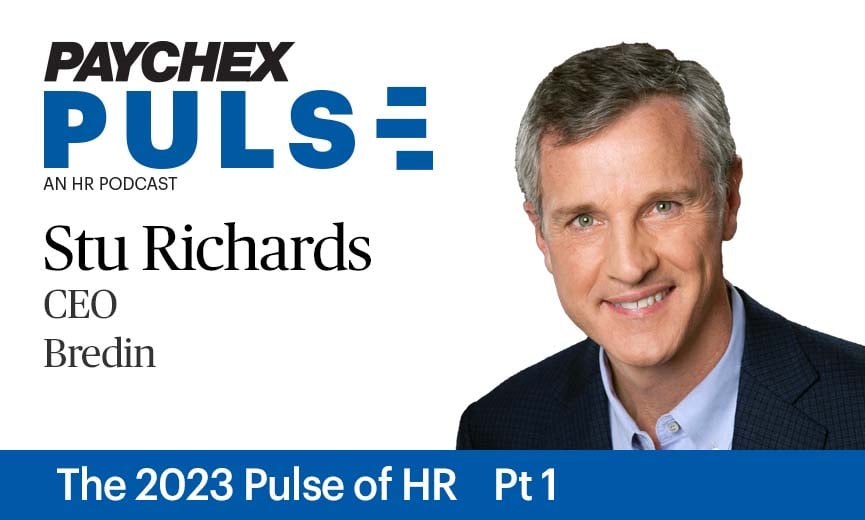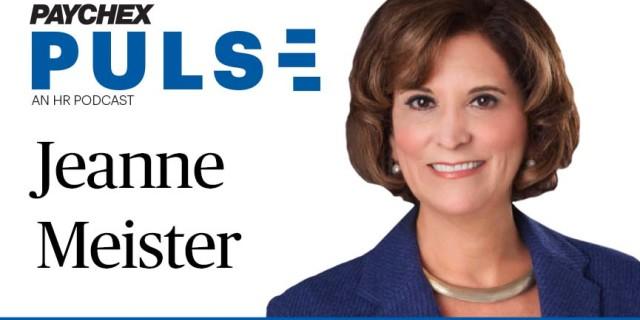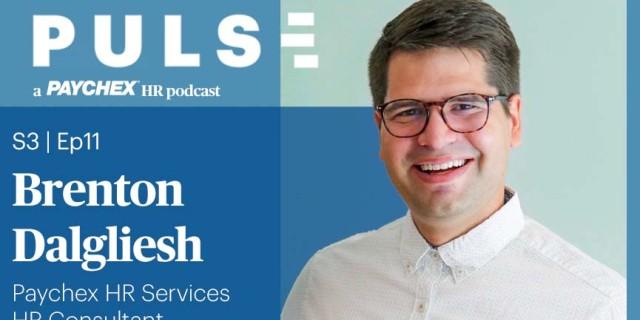The Rise of Digital HR: Taking the Pulse of HR in 2023 - Part 1

Podcast •

Vea
Resumen
En este episodio de Paychex PULSE, un podcast de RR. HH., Stu Richards, CEO de Bredin Research, nos ofrece una visión general de los resultados de la 7.a encuesta anual Pulso de Recursos Humanos junto al presentador Rob Parsons. Descubra lo que piensan 1350 líderes empresariales y de RR. HH. de los Estados Unidos y cómo utilizan la tecnología para adaptarse al trabajo remoto, mejorar la productividad y el bienestar de los empleados, entre otros.
Los temas incluyen:
00:00 – Welcome Stu Richards
00:36 – Evolution of the Pulse of HR Report
01:47 – Discoveries from the 2023 Pulse of HR
03:00 – The role of technology in HR
03:48 – Making hybrid work, work
05:02 – The genesis of AI in the workplace
06:28 – AI and workforce analytics
07:43 – How different roles are using HR tech
09:10 – Researching HR tech
10:53 – Wrap up
Download the 7th Annual Pulse of HR Report.
Watch, listen, and explore episode 2 and episode 3 of this series.
Find out more about the benefits of HR technology.
Discover the right Paychex solutions for your HR needs.
Ver transcripción
Rob Parsons (00:00):
Hi everyone, I'm Rob Parsons. Welcome to the Paychex PULSE podcast. This is part one of a three-episode series focusing on research Paychex has conducted on the Pulse of HR in 2023. Joining me to discuss this research is Stu Richards the CEO of Bredin, who conducted the study for us. Bredin is a B2B marketing consultancy that helps develop profitable long-term relationships with businesses through original market research and outreach programs. Stu, welcome to the podcast. It's great to have you back.
Stu Richards (00:34):
Rob, thanks for having me, it's great to be here.
Rob Parsons (00:36):
This is exciting because this is the 7th Annual Pulse of HR survey. So, we've been doing this for some years now. How has it evolved over time? How's the impact evolved and how's even just the nature of the audience and the questions evolved?
Stu Richards (00:49):
Well, Rob, it's evolved quite a bit. So, when we started back in 2016 the survey sample was pretty small and we were really focused on just asking a very tight set of questions to owners of businesses, business principles, specifically around at the time were some important questions around regulatory changes. And since then, we've evolved quite a bit to a broader sample of business sizes and not just focusing on business principles, but also trying to get a sense of what's in the head of HR leaders as well. So bigger sample, broader range of companies, broader range of respondents, but also a much wider range of questions that we're trying to understand around what's working in managing an employee team these days from the perspective of business owners and HR leaders.
Rob Parsons (01:38):
That's great and it really has become very useful information for peers to look at to see what's working and what isn't and what's happening. What the trends are.
Stu Richards (01:46):
Absolutely.
Rob Parsons (01:47):
So, tell me, in 2023, we just completed it, we're getting ready to publish, what were the top line results? What were the things you found interesting coming out of this survey?
Stu Richards (01:58):
Oh my gosh, there were quite a few learnings. We asked a lot of questions, but one of the things that was really I don't know if it's surprising, but a big, something that really jumped out was the continued use of the hybrid or remote work arrangement and how important it is for both business leaders and HR leaders to set remote or hybrid workers up for success, whether it's through training or through the use of technology. And the use of technology was something that we just see continue to accelerate. And whether it is simply to boost employee productivity or really to help with training or even supporting mental and emotional wellbeing. It was really striking to us how important the role of technology is, especially in AI, I know it's something that we'll talk a little bit about, but it was really striking to see how interested organizations are in taking advantage of AI as one of the ways to take advantage of technology overall.
Rob Parsons (03:00):
That's a great lead in, because I wanted to take a deeper dive into the technology story. You saw some different needs and expectations even based on the respondent's role within the company. Different people were looking at technology in different ways, weren't they?
Stu Richards (03:15):
Yeah, yeah. So, for HR leaders, one of the things it was kind of surprising, because it was relatively tactical, but obviously important things. So, for HR leaders they were most interested in using technology, for example to let remote or hybrid workers simply book an office or a conference room when they're coming into the workspace during the day. And for principles overall, it was really around the use of technology for training and support to help employees be as productive as they can in their roles.
Rob Parsons (03:48):
I like that you touched on productivity, that really seemed to be a theme this year was the idea that we've adjusted a lot, but now it's time to get back down to business. Can you touch on that a little bit?
Stu Richards (03:59):
Yeah, it was interesting, because right now for example, when you talk about productivity the most common work arrangement, not the majority, but the biggest single group of respondents were those who still have some sort of remote or hybrid work arrangement that'll continue to be the mode for the next 12 months or so. But the biggest group of respondents also said that in the long term they do want to bring employees back into the workspace. For many, many businesses they have to be there. If you're a retailer or manufacturer, warehousing, you’ve got to be on site. But for other businesses, like in professional services, it is really important for them to eventually bring the teams back together to take advantage of the creativity, the interplay of the team in coming up with new ideas. And so, we saw a lot of emphasis around optimizing productivity for remote workers now through technology, through training, through benefits, but also, we saw a lot of emphasis on eventually setting the stage for teams to come back on site.
Rob Parsons (05:02):
And a lot of what we've been thinking about here is this whole concept of digital HR. And really using HR to not just improve processes, but even change the nature of the business. A big part of that, of course is going to be AI. And what did you see this year with AI?
Stu Richards (05:18):
Huge utilization, which is surprising, because it is such a relatively new and if you think of, for example, the genesis of ChatGPT, literally just a few weeks ago really booming into public consciousness. But it is a very linear progression. The bigger the company we surveyed the more likely they are to be using AI. But even the smallest companies they know it's out there, they know it's something they should be taking advantage of at some point. Right now, the way that we are seeing companies take advantage of it most in the HR domain is for applicant screening and tracking, which makes a lot of sense, but there's a whole host of ways that companies are going to be taking advantage of AI, like for example, for virtual assistant or for research or all kinds of ways. And we see really huge interests. So, we did research at Bredin separately just specifically looking at AI. And we saw that in the back half of this year it's the application category with the single biggest purchase in town, much more than financial management or any other category. So, we really see that category booming in the B2B space.
Rob Parsons (06:28):
That's so interesting. And it kind of ladders into what we've seen also on our side, the whole idea of machine learning when it relates to analytics and figuring out what's going on with the workforce what isn't and just how people are measuring success. So, what did this year's survey reveal about the analytics side of the equation?
Stu Richards (06:49):
Yeah, it was interesting, Rob, but what we're seeing is not just using HR tools to determine how effective individual employees are being or individual teams are being, but really we saw a desire to use analytics better. For example, to assess the uptake of benefits. And so, for example, one of the things that we saw in throughout the research was an interest especially on the part of principles and of course on HR leaders around, for example, employee mental health or wellbeing. And we saw interest in the use of analytics among other things and understanding the uptake of benefits like different kinds of programs around mental health that can be used to ensure that employees are doing as well as they can and as a result being as productive and effective as they can within an organization.
Rob Parsons (07:43):
And it feels like there's even different approaches to it. You touched on it a little bit. HR leaders are looking for HR success stories, ROI, are the efforts we're making paying off? Maybe principles are looking at workforce management, productivity, compensation strategies. So, tell me a little bit more about the difference you saw between HR leaders and principles across that whole technology spectrum.
Stu Richards (08:10):
Yeah, it was interesting. The HR leaders they're very focused on, at the end of the day, making sure that employees are kind of as happy and as motivated and a productive as they can be. And we were kind of surprised to see the principles were really concerned about employee, again, wellbeing overall, which I think is there's a lot of commonality, but that really jumped out in terms of how principles were concerned about that. But we saw that the HR leaders were specifically concerned around the use of technology, as you mentioned, for optimizing productivity and making sure that individual employees are trained as well as possible to be as productive as possible. And the principles overall were really focused on making sure that employees, overall, have the tools that they need to succeed and understand what their objectives are and can achieve them as effectively as possible.
Rob Parsons (09:10):
Got it. Now, we didn't talk about this a lot prior, but part of the study focused on even how people like buying technology or researching technology. So, what's going on in the HR technology space? How are people approaching that?
Stu Richards (09:25):
Yeah, it varies a little bit when you look at for example, the role. So, one of the things that jumps out is search, across the board, is the number one way that either business leaders or HR leaders are researching HR. But when you look at how overall those two roles are making a purchase decision the HR leaders also are, I'm sorry, the principles are also most likely to rely on search. But HR leaders like to go to their peers. So, they want to learn from other HR leaders, which is one of the reasons that we love doing this kind of research is to be able to provide those kinds of peer insights. But generally, what we saw was a real reliance on search either to understand what kind of HR solution options are out there. And a lot of use of advisory content. By which I mean a thing like a white paper or a research report or an analyst report or an infographic. Very heavy reliance, slightly different formats at different stages of the sales cycle. And depending on the size of the organization if there is any kind of a third-party HR consultant if there's a heavy reliance, especially by HR leaders on that kind of a role as well.
Rob Parsons (10:41):
That makes complete sense. It is not getting easier, just based on what we've seen the technology's just becoming more comprehensive.
Stu Richards (10:49):
It is.
Rob Parsons (10:49):
And really infiltrating every part of the organization.
Stu Richards (10:52):
It absolutely is.
Rob Parsons (10:53):
Stu, thanks for joining me today.
Stu Richards (10:55):
Yeah, Rob, this is a pleasure.
Rob Parsons (10:56):
I'm looking forward to digging into the findings more. We have a couple more episodes planned where we're going to dig into some specific aspects. So, I encourage our listeners to join for episodes two and three of this series. And if you're interested, you can find a link to the survey in our show notes. So, Stu, thanks again.
Stu Richards (11:13):
Thank you, Rob.
Rob Parsons (11:15):
Thank you to our listeners, and as always, please stay happy and healthy. Be sure to subscribe to this and our Paychex THRIVE business podcast on your favorite podcast platform. Looking for more ways to keep your finger on the pulse of industry dynamics, visit our resource center for the latest research, thought leadership, and news at paychex.com/worx. That's W-O-R-X. Thanks again for joining us. Until next time, please stay happy and healthy.
Announcer (11:46):
This podcast is property of Paychex, Incorporated 2023. All Rights reserved.

 Apple Podcast
Apple Podcast Spotify
Spotify iHeartRadio
iHeartRadio









